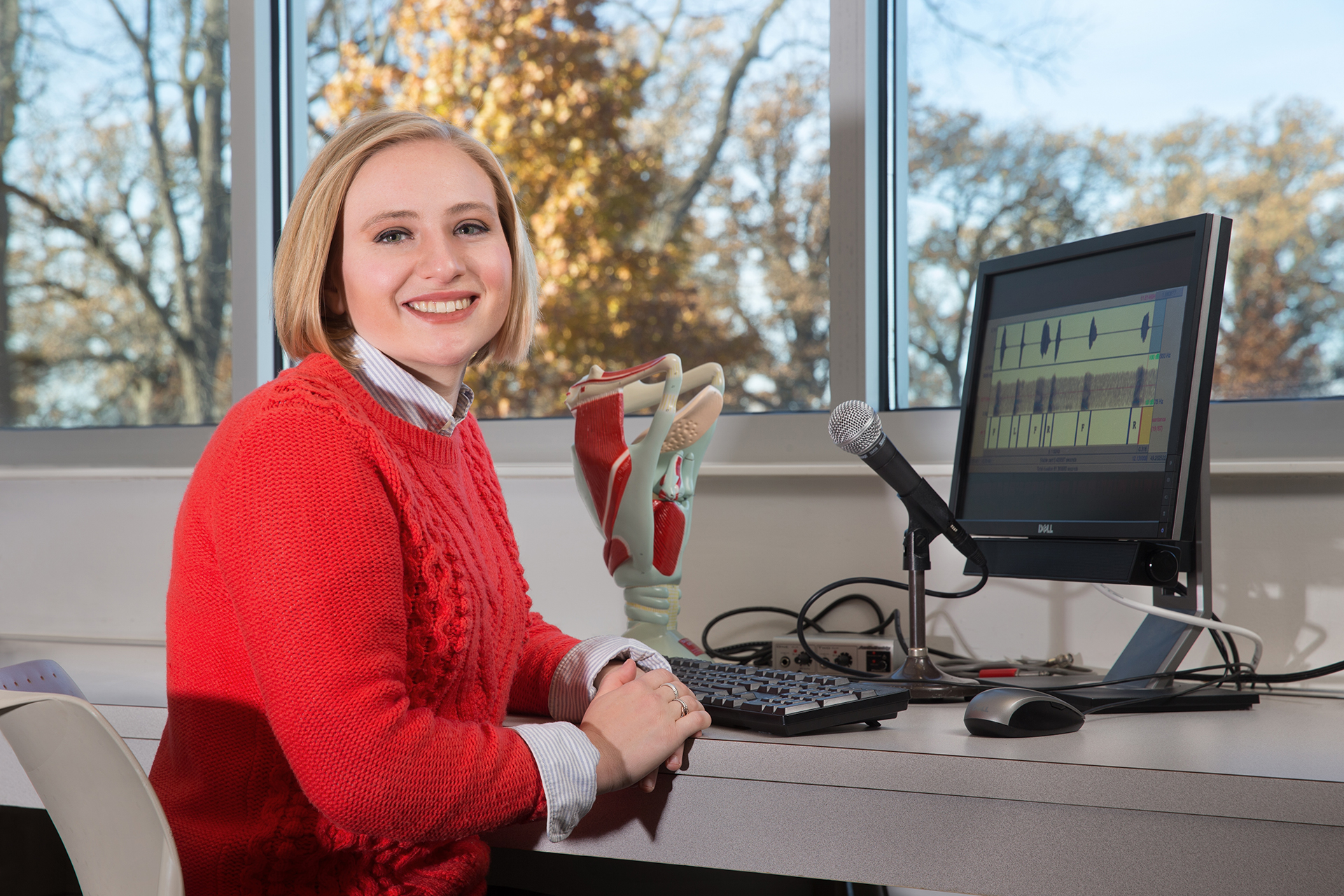

Looking at life through a language lens benefits Clune
Opportunity for research, CDIS program big draws for BGSU
By Bob Cunningham
Tarynn Clune knew early in high school she wanted to study speech language pathology in college. Clune was so sure of this that she got a job as an activities assistant in the reminiscence care side of the local care facility, Elmwood Assisted Living.
By the time Clune was ready to look at colleges, Bowling Green State University quickly jumped to the top of her list of Ohio state schools.
“I knew I wanted to stay in state and I knew that I wanted to major in Communication Sciences and Disorders (CDIS),” said Clune, who is from New Breman, Ohio, southwest of Lima.
“One of the things that brought me here was definitely the amount of support Bowling Green gives to students, scholarship-wise. I also enjoyed my interactions with the Honors College and Dr. Lynne Hewitt, who is the head of our department in CDIS. I got to talk to a few people that I didn’t necessarily get to talk to at other colleges.”
Now, she is graduating with a 3.95 GPA and waiting to see which of the four graduate schools she applied to, including BGSU, accepts her application.
Clune said she always has been linguistically inclined and looks at things through a language lens, which helped her fall in love with the reminiscence care population, seeing their need for communication. It also helped her decide what direction to take for her research project.
“It’s definitely led to a better appreciation and understanding that it’s more than memory loss,” said Clune, who has been working with dementia patients since she was 16. “There’s a lot of other challenging aspects to it that I do believe our field can help with. We just have to get our minds around the best way exactly to do it.”
Her work focused on what kind of activities can help foster communication and social engagement among residents. She discovered there are many activity types, as well as possible training or strategies, that facilitators can use even if they’re conducting an activity that isn’t necessarily the most beneficial communicatively.
“There are more physical-based activities like noodle ball, which is where each resident gets a little piece of a pool noodle and they blow up a balloon and they bat it around,” she said. “They play catch and throw a ball around a circle, things like that. There are a lot of arts and crafts, sing-along activities and music therapy. There really is a range, and it depends a lot on the director what they plan.
“But what I looked at is, of these types of activities, which activities seemed to work most for some of the residents, which activities didn’t work so well, as well as what characteristics could potentially be imbued in those lower-ranging activities from the higher-ranging activities.”
During her time at the University, Clune was president of the BGSU chapter of the National Student Speech Language and Hearing Association (NSSLHA) and an ambassador to the Honors College. She also presented her capstone research project, “Vocalizations Elicited by Leisure Activities in a Dementia Unit,” at the NSSLHA national convention in Los Angeles.
“It’s really an ideal place to be as a student, but it was even more ideal that I got to present some of that work in front of the national research community,” she said. “I’ve had a lot of really great experiences come out of my capstone project. It’s the project I had to complete to graduate with honors, but it’s turned out to be so much more than a capstone project.”
She also received awards for two of her papers from the Ohio Association of Gerontology and Education and submitted her research to the peer-reviewed journal Clinical Archives of Communication Disorders.
Ultimately, Clune would like to be an academic, especially since her field is going through a shortage right now.
“My interest in research just happened to fall at the right time when it’s totally feasible to be a researcher and become a professor,” she said. “I can’t think of anything more fun than answering your own questions for the rest of your life as a career, training the future of your profession as well as pursuing what you find interesting. To me, that’s the dream. If there is a job market for it, I’m going to be one of the people who fill that need.”
Updated: 12/18/2017 10:41AM
